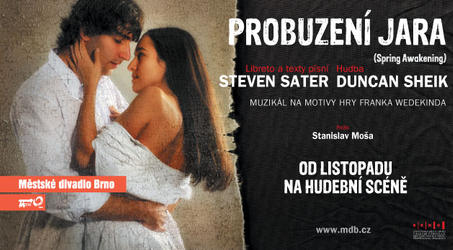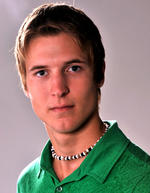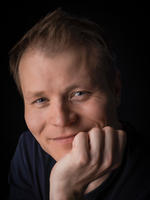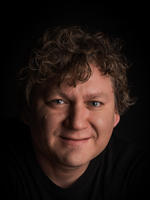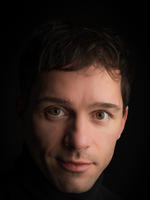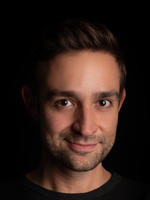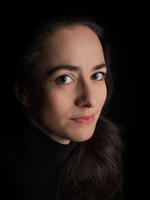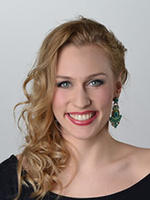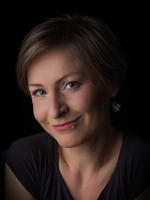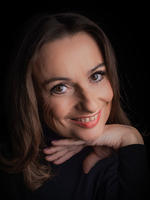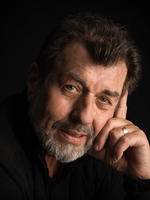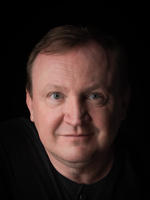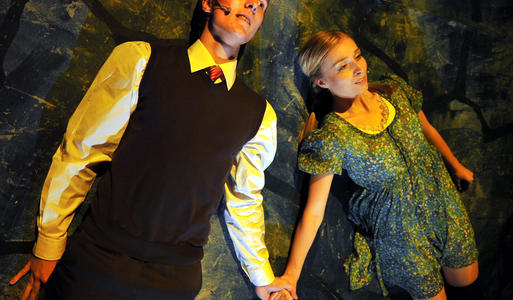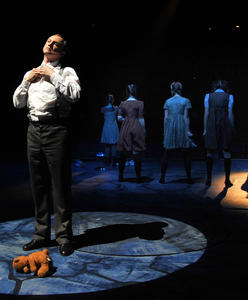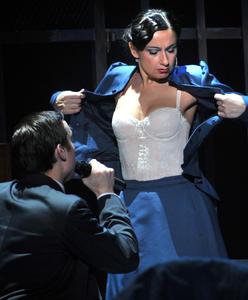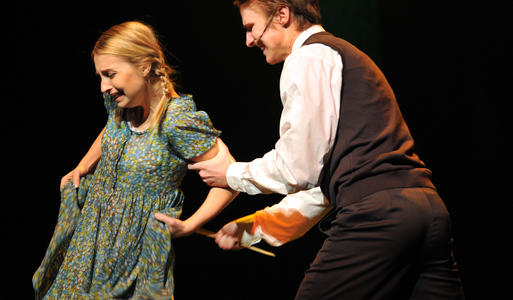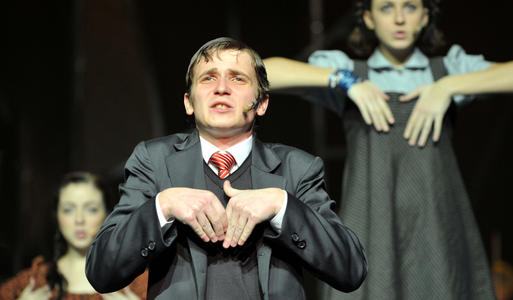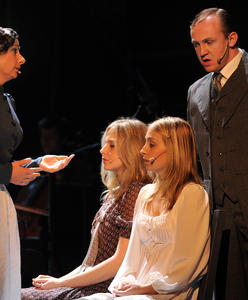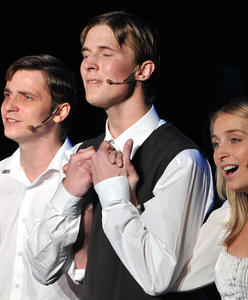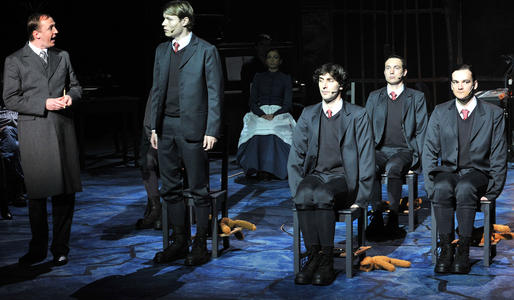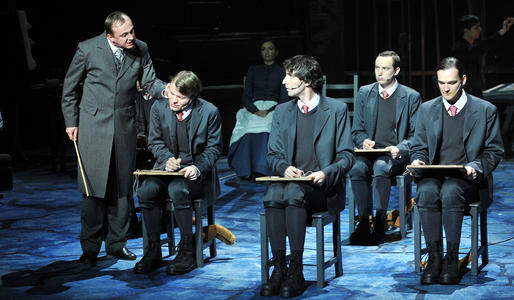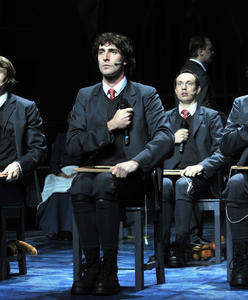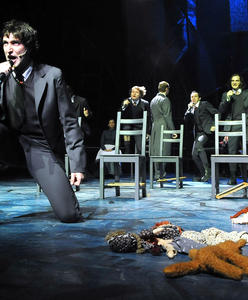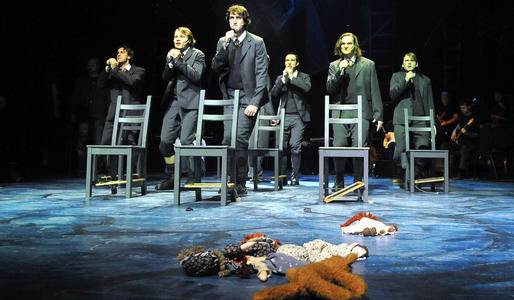Brno woke up Prague’s musical enthusiasts
27. September 2010 zdroj www.topzine.cz
The ensemble of Brno City Theatre came to Prague to demonstrate what a real musical looks like. Spring Awakening literally woke up the New Stage of the National Theatre and the spectators who came.
The daring work Spring Awakening, which shows all kinds of angles on love, was hosted by the Prague theatre for two days, on 24th and 25th August 2010. This originally American musical was translated into Czech by Jiří Josek. It speaks, completely openly, about first sex, love and sexual orientation, but also about problems brought about by the undying and almost fanatical desire for convergence of a father and daughter. Also, another problem for young people has its place here – school. Moritz is expelled from school, and what is he supposed to do? His life is in ruins, just like the life of a girl who is ill-treated by her father. What can this result in?
A comedy results in a tragedyThe first half is highly comical with the increasing intimate relationship particularly of the main couple and the topic of getting to know one’s body, including Jenda’s courageous masturbation directly on the stage, will bring tears to the eyes of the spectators. Tears of laughter. However, tears will also appear at the end of the performance. This time they are teardrops caused by a tragic turn of events, the fatal end of young loves and young lives. This tragedy can touch everyone’s heart, even though it shows the nature of first love.
What is it that Prague theatres should learn from Brno? Most of all, it’s about the cast. There wasn’t a single actor or singer who couldn’t master all the disciplines a proper musical should have. This means no low quality (or even out of tune) singing in the musical-theatrical genre but rather clear and pure performances given with feeling. As can be seen, the play doesn’t have to have actors known to the media in order to be proclaimed a quality performance. The only actor who you may know very well from the TV screen was Hana Holišová. You may know her from the series Velmi křehké vztahy on Prima TV. In Spring Awakening she presented herself, and how else than excellently, in the role of Elsa. The main role was acted by Svetlana Slováková as Wendla, accompanied by Jiří Mach as Melchior. Vojtěch Blahuta gave the most amusing performance in the role of the student Moritz.
Losing track of the charactersEven though the piece is really well made, I would criticise the presence of microphones on the stage. It would be better if the actors just used ports as it would give the performance more of a realistic feeling and would look less like a concert. Similarly, it wasn’t very impressive that Zdeněk Junák and Jana Musilová were parents to several of the characters and on top of that, they played the professors as well. It needs only a moment of thinking about something else and the distracted spectator has lost track of who’s who among the characters that are played by the same actors.
Despite these little flaws, this work directed by Stanislav Moša will certainly be remembered by those present. Thanks to the amount of emotions which the actors convey to the spectators and also thanks to the beautiful songs, they will have an experience to remember their whole life. So, let’s look forward to the next visiting Brno performance.
The musical as a generational protest song
Vít Závodský 23. February 2010 zdroj Týdeník Rozhlas
The modern Music Theatre of Brno City Theatre is often called a theatre of the third millennium. In the five years of its existence, it has offered a total of thirty productions, out of which ten are world premieres and fifteen Czech ones. Besides their unusual interpretational quality, the two recent Czech musical premieres have in common a praiseworthy effort to rise above the commercial courting of popularity and search for a topical and motivating message. First, there was the Central Europe - oriented original work by Prague native Michael Kunze and Hungarian composer Sylvester Levay, Mozart! (the hero looks like a Bohemian rocker). This was immediately followed by Spring Awakening by the librettist Steven Sater and composer Duncan Sheik, who also once stayed in Brno. This Broadway title has already been awarded eight prestigious Tony Awards since its premiere in 2006.
The once scandalous and proscribed “child tragedy” (1891) by Frank Wedekind is one of the director Stanislav Moša’s all-time favourites. His jazz-rock version, with an apposite translation by Jiří Josek, was produced with a team of tried and tested co-workers – conductor Karel Škarka, artists Jaroslav Milfajt and Andrea Kučerová, and choreographer Aneta Majerová. While maintaining the theme as well as period facts, he has managed to make topics which were once taboo contemporary (the erotic confusion of puberty, homosexuality, illicit abortions, and suicide) and accentuated them with the topical motifs of bullying and child abuse. Even though caning isn’t a threat anymore when memorizing Virgil, and one no longer finds oneself dependent on a schoolmate’s notes for erotic knowledge, the lack of understanding from the child’s close environment, conflict with authorities and various intergenerational conflicts are topical even these days. The student characters – Melchior, Moric, Wendla and others – have up to three distinctly creative alternates, and their maidenly private as well as collectively strong performances progress from infantile naivety to a state of severe protest. All the adult characters, on the other hand, are generalized and acted only by two actors, and the area of the stage like a prison cell where actors outside the action are sitting, along with a sparse orchestra and a few spectators evokes the atmosphere of a public trial which involves all of us. This fairly short evening with a minimum of stand-out hits makes do without simplistic naturalism and moves towards an impressive catharsis in a chillingly thickening atmosphere.
Spring Awakening at the New Stage of the National Theatre
Veronika Břešťanová 5. February 2010 zdroj musicalnet.cz
In a space which is untraditional for musical theatre, at the New Stage of the National Theatre in Prague, Brno City Theatre presented their adaptation of the American musical Spring Awakening as part of the Czech Theatre Festival organized by the Foibos agency on 5th February.
On 21st November 2009 Brno City Theatre was the first Czech theatre to perform this American musical, which obtained eight Tony Awards in the USA in 2007. Based on the motif of a theatre play by the German playwright Franz Wedekind, the script and texts were written by Steven Sater and the music was composed by Duncan Sheik. Jiří Josek took care of the Czech translation. He translated some of the original names, at least partially, and so the original Moritz is now Moric in the Czech version, Hanschen became Jenda and Ilse is named Elsa.
Stanislav Moša’s version also presented fresh faces as well as the well-proven veterans of Brno City Theatre. The spectators could have been surprised by the fact that the actors used, apart from the standard micro ports, also hand-held microphones for their singing, hidden in parts of their costumes.
As is the good custom in Brno, the participants were accompanied by a live orchestra under the leadership of Karel Škarka, who was, similarly as in the USA, placed directly on the stage. Two rows of theatre seats were also placed on the stage, and the members of the so-called offstage ensemble, among other people, sat there and joined in the choir songs.
The story takes place at the end of the 19th century at an unspecified place. We follow the life story of a young girl, Wendla, her friends and students at a local school. These young people are just discovering their sexuality against the background of a rigid society where neither the parents nor the teachers are willing to teach them about sex, masturbation or similar “controversial” topics.
For the Prague audience, the cast was composed mainly of unknown actors. The only person well-known in the media was Hana Holišová in the role of Elsa. However, Brno City Theatre sent actors of a very high quality. Unambiguously excellent was the choice of Ivana Skálová for the role of Wendla. She could finally show her very distinct talent and the role suited her greatly. Jiří Mach is ideal as the charismatic leader Melchior. Lukáš Janota acted the role of neurotic Moric – some people in the auditorium might know him from the second series of Czech Superstar and musical fans could have seen him, for example, in Godspell or as a member of the company in various productions at Brno City Theatre. His singing abilities were sufficient for the role.
In the roles of the girls, the spectators could see Johana Gazdíková as Thea, Kateřina Krejčová as Anna and Tereza Martinková as Anna. The group of boys consisted of well-proven names such as Jakub Uličník as Otto, Lukáš Vlček as Jenda, Tomáš Novotný as Ernst and Radek Novotný as Georg. In the roles of the adults we could see Jana Musilová and Milan Němec, both of whom switched from role to role: for example, the mother suddenly changed into the piano teacher, the school director into an understanding father.
It needs to be admitted that Spring Awakening by Brno City Theatre, at least with the cast we could see in Prague, was immensely successful and is certainly comparable with foreign productions. Director Stanislav Moša was successful with the adaptation of this hit, and it is certainly worth going to see this musical, which has already become a cult piece, for example at Brno City Theatre.
This musical sends chills down your spine…
Luboš Mareček 27. November 2009 zdroj MF Dnes
…but it is a great experience
The Czech premiere of the new international musical Spring Awakening by Steven Sater and Duncan Sheik was presented in Brno at the weekend. The piece, which is a musical version of the scandalous "children's tragedy" of the same name by Frank Wedekind, was unusually successful immediately after its American introduction in 2006. It soon arrived on Broadway and gained eight prestigious Tony Awards.
Director Stanislav Moša hasn't merely imported an overseas hit to Brno City Theatre, however. Brno's Spring Awakening is indeed a remarkable work in all aspects of its music, set and content. Instead of an empty presentation of a mainstream pop culture topic, as we know from other productions, this musical is an inventory of hundred-year-old but unusually contemporary topics.
A masterpiece
This story of adolescent children who are fighting their awakening sexuality and the non-understanding stubbornness of the adult world has obtained an interesting jazz-rock packaging. You won't hear any particularly popular hits, or see sparking musical arrangements full of glitter. The stage is one big cage in which a seven-member orchestra is sitting, together with all the participants and even a handful of spectators. Everybody is affected.
How to use one word for all the production elements? In this case, I will use the word urgency. Topics like home violence, child abuse, bullying and homosexuality emerge in their acuteness from the decent chamber packaging. It is surprising how a musical version of a text from the year 1891 can make the audience feel awkward even today. The audience buzzes when paedophilia is mentioned, or when two boys kiss on the stage.
However, the director, Moša, doesn't emphasize the scandals. He sensitively extracts the individual stories from the children's mosaic of confused feelings and reactions. Impressive, well-directed lighting, a full musical arrangement, inventive choreography and all the singing performances make Brno's Spring Awakening a masterful theatrical piece, and also a strong experience for the spectators.
Steven Sater, Duncan Sheik: Spring Awakening
David Kroča 26. November 2009 zdroj A review for Czech Radio Vltava
Brno City Theatre, Music Theatre, premiere on 21st November 2009
The musical Spring Awakening keeps to all the main story lines of Wedekind's original. At the centre of the events is the relationship between Melchior, a fourteen year pupil at a boy's school, and Wendla, who is of the same age but has no experience with love. It finishes with the girl's pregnancy. The story of the young couple has a tragic end as the boy is sent to reformatory school and Wendla dies during an illicit abortion. The world of the young people is in sharp contrast with the adult world, which shows off its morals but makes fatal errors in reality.
The librettist of the musical expressed his antipathy to this world by having only two actors play all the adult characters, and so the teachers, parents as well as preachers all blend into one shapeless mass. The young people are, in contrast, full-blooded characters who are full of life and energy. Dealing the cards in such a way perhaps follows a certain trend, but it also makes it possible to play a game which shows that 'hypocritical petty-bourgeois' is not just a dead term, particularly if you disturb the calmness with topics such as sexual maturing, home violence or homosexuality.
Director Stanislav Moša not only unveils the topical edge of what was some time ago a scandalous original work, but also wishes to produce this provocative text as a public trial in which the spectators in the auditorium also gradually come to be part of the process.
Some of them really sit in added rows on the stage and mingle unobtrusively with the participants, who repeatedly disappear amongst the crowds after their appearances. The possibilities of this production tactic are also revealed e.g. in the shocking song with the topic of home violence and incest, when more victims gradually join the one who is singing as if they have just found the courage to disclose their problem.
In fact, every musical number in this musical takes the form of a strong personal testimony from one of the protagonists. The authenticity of the songs is fortified by the live orchestra, which is directly on the stage, causing the story of Melchior and his friends to remind us of a rock concert.
An important feature of the dramatic expression in this work is the ambiguity of behaviour, which leaves space both for comicity and at the same time body language and physical action, creating scenes full of emotion on the stage. The actors managed the extreme situations honourably, although the script doesn't make things any easier for them, as it is rather explicit in some intimate scenes. Svetlana Slováková acted very well as Wendla in the performance that I saw. The young actress lent the character the needed naivety and vulnerability, as well as a big dose of youthful desire and effervescence. Ondřej Bábor, in the role of Melchior, was similarly successful in this respect, but as one of the boy characters he remained somewhat in the shadow of thrillingly unbalanced Moritz, acted by Vojtěch Blahuta. As far as the singing is concerned, Hana Holišová is dominant in the role of Ilse, to whom the last song of the finale belongs.
"Listen to the song/ which sounds in a child/ it isn't always happy," says Jiří Josek's translation, and those verses could also be the motto of the musical. It can be seen from them that it is aimed at us, adults, who have forgotten the troubles of our own adolescence, rather than at giggling teenagers. This provocative musical piece written by American authors refreshes the memory with relentless openness.
The art of loving at Stanislav Moša's theatre
Jiří P. Kříž 25. November 2009 zdroj Právo
Life seems to be totally shit, you are caught in a trap and you have nowhere to go - the young get angry in Spring Awakening
Wedekind's Spring Awakening is one of European theatre's great thematic works. It deals with a dispute between the parental-pedagogical generation and children on the edge of adolescence and puberty.
The conflict hasn't changed since the creation of the play (1891). It is in the interests of the petty bourgeoisie in their hypocrisy to try to overlook such issues, render them taboo and censor their reflections.
Librettist Steven Sater and musician Duncan Sheik dug up this excellent play during the period of social prudery that was the Bush era. They brought the musical Spring Awakening to the world Off-Broadway in spring 2006, and also to Broadway's O'Neill Theatre in the same year.
A very different musical
Three years after the world premiere of this production, which was so different from New York musical theatre convention, and which immediately spread onto European and international stages, Stanislav Moša brought Spring Awakening to the stage at Brno City Theatre.
Where else could it have happened in the Czech Republic, actually?! The Music Stage at Brno City Theatre rises three floors above everything that is happening here in musical and operetta since the qualitative liquidation of Karlín in Prague by the municipal authorities. And that's without mentioning the more and more similar and ludicrous ideas found in private productions: Shweik was superarbitrated six feet under after several repeats due to the utter stupidity of the authors.
After Tokyo, Rio, Sydney, Buenos Aires, London and other European cities, Spring Awakening is now in Brno (premiere 21st November), with its controversial and moving story in which parental, school and church education drill stands in contrast with erotic maturing and brittle understanding, which in the unpreparedness and inconclusiveness of prudish society can lead even to death.
Thank God for Jiří Josek's translation - he can make even Shakespeare feel 'closer' with his use of contemporary language. Why shouldn't Wedekind and his sensitive American translator Sater be on his wavelength? And for the jazz-rock specialist Sheik, who turned things back and yet moved the musical a lot forwards, at least in melodicity, but perhaps also in trueness to life.
Excellent Holišová
Admiration is well deserved by "the adults", Irena Konvalinová and Zdeněk Junák (in alternation with Jana Musilová and Milan Němec). They play all the parental and teachers' roles on stage. Of the group of youths, who are in dispute with the educators and their own inexperience, the perfect 'musical-style' performance by Hana Holišová (Ilse) stood above the others at the first premiere. Of course, Svetlana Slováková (Wendla), Jiří Mach (Melchior) and Vojtěch Blahota (Moritz) are all worthy of attention. In this review, I only have space to praise Aneta Majerová ´s first independent foray into choreography, the ornamental scenography by Jaroslav Milfajt and the costumes by Andrea Kučerová…

